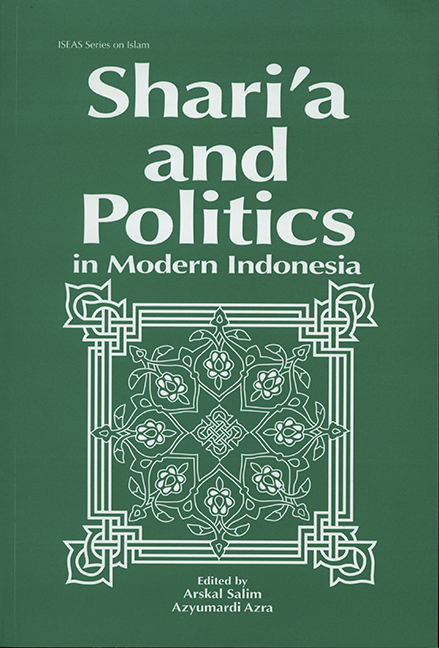Book contents
- Frontmatter
- Contents
- Acknowledgments
- List of Contributors
- Glossary
- 1 INTRODUCTION: The State and Shari'a in the Perspective of Indonesian Legal Politics
- 2 LAW AND POLITICS IN POST-INDEPENDENCE INDONESIA:A Case Study of Religious and Adat Courts
- 3 THE STATE AND SHARI'A IN INDONESIA
- 4 THE STATE'S LEGAL POLICY AND THE DEVELOPMENT OF ISLAMIC LAW IN INDONESIA'S NEW ORDER
- 5 THE INDONESIAN MARRIAGE LAW OF 1974: An Institutionalization of the Shari'a for Social Changes
- 6 INDONESIA'S 1989 RELIGIOUS JUDICATURE ACT: Islamization of Indonesia or Indonesianization of Islam?
- 7 THE POLITICAL BACKDROP OF THE ENACTMENT OF THE COMPILATION OF ISLAMIC LAWS IN INDONESIA
- 8 ISLAMIZING CAPITALISM: On the Founding of Indonesia's First Islamic Bank
- 9 FATWA AND POLITICS IN INDONESIA
- 10 ZAKAT ADMINISTRATION IN POLITICS OF INDONESIAN NEW ORDER
- 11 ISLAMIC VALUES, LAW AND EXPECTATIONS IN CONTEMPORARY INDONESIA
- 12 EPILOGUE: Shari'a in Indonesia's Current Transition: An Update
- APPENDICES
- Bibliography
- Index
3 - THE STATE AND SHARI'A IN INDONESIA
Published online by Cambridge University Press: 21 October 2015
- Frontmatter
- Contents
- Acknowledgments
- List of Contributors
- Glossary
- 1 INTRODUCTION: The State and Shari'a in the Perspective of Indonesian Legal Politics
- 2 LAW AND POLITICS IN POST-INDEPENDENCE INDONESIA:A Case Study of Religious and Adat Courts
- 3 THE STATE AND SHARI'A IN INDONESIA
- 4 THE STATE'S LEGAL POLICY AND THE DEVELOPMENT OF ISLAMIC LAW IN INDONESIA'S NEW ORDER
- 5 THE INDONESIAN MARRIAGE LAW OF 1974: An Institutionalization of the Shari'a for Social Changes
- 6 INDONESIA'S 1989 RELIGIOUS JUDICATURE ACT: Islamization of Indonesia or Indonesianization of Islam?
- 7 THE POLITICAL BACKDROP OF THE ENACTMENT OF THE COMPILATION OF ISLAMIC LAWS IN INDONESIA
- 8 ISLAMIZING CAPITALISM: On the Founding of Indonesia's First Islamic Bank
- 9 FATWA AND POLITICS IN INDONESIA
- 10 ZAKAT ADMINISTRATION IN POLITICS OF INDONESIAN NEW ORDER
- 11 ISLAMIC VALUES, LAW AND EXPECTATIONS IN CONTEMPORARY INDONESIA
- 12 EPILOGUE: Shari'a in Indonesia's Current Transition: An Update
- APPENDICES
- Bibliography
- Index
Summary
For Muslims, the authority of Islam is an alternative to the authority of the state, regardless of that state's particular ideological persuasion. This is as true now as it was for the Abbasids, the Ottomans, the former Soviet Union and the Imperial European powers of the 19th and 20th centuries. The issue has not subsided with the demise of imperialism. The successor states must still face and accommodate it. In the past 50 years, the relationship between the Indonesian state and Islam has changed constantly depending on the political circumstances of the time, ranging from oppression, conflict and control to an uneasy accommodation. It is a relationship that is difficult to characterise with any precision. It would be overfacile, for example, to describe any period of the relationship only in terms of conflict. Equally, accommodation, or attempts at accommodation, have not been overwhelmingly successful. Recently, however, the Indonesian state appears to have struck a more positive balance with Islam. The government has provided for the integration of syariah into the rapidly developing state.
Essentially, the issue is authority. Islamic purists claim authority from
Revelation; secular nationalists claim authority from the Constitution of the state. The ideal for some Muslim activists is the Islamic state. However, this in itself is a contradiction. Authority can have only one locus. The issue is always who has the power to exercise authority, and how this power is to be divided, controlled and transferred. As Pakistan shows, Islamic jurisprudence provides no sufficient answer for the contemporary nation state. Indeed the arguments about the nature of the Islamic state in the contemporary Muslim world usually reduce themselves to little more than vague generalities supposedly founded in seventh century Muslim practice. On the other hand, proponents of an Islamic basis for the state can and do point to parts of Islamic law (for example, family law) where rather more specific provisions are available.
The forms and expressions of the nation-state, such as constitutions, legal codes, and the distribution and separation of powers have developed from European political history over the past two centuries.
- Type
- Chapter
- Information
- Shari'a and Politics in Modern Indonesia , pp. 33 - 47Publisher: ISEAS–Yusof Ishak InstitutePrint publication year: 2003



